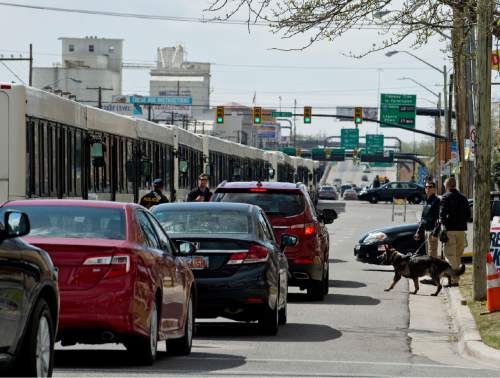This is an archived article that was published on sltrib.com in 2015, and information in the article may be outdated. It is provided only for personal research purposes and may not be reprinted.
Proposition 1 — to raise sales tax for transportation — hit a rocky road Tuesday, winning in some counties and losing in others.
Prop 1 went down to apparent defeat in Salt Lake County by a razor-thin 50.9 percent to 49.1 percent margin, according to the final unofficial tally on election night. That came even though proponents spent heavily on advertising there, while critics spent nothing.
Supporters were not willing to concede defeat in Salt Lake County, noting that late-arriving votes by mail still could reverse that result.
The final vote canvass comes in two weeks.
"We're down by about 2,600 votes," and thousands of ballots could still be counted, said Abby Albrecht, campaign director for the pro-Prop 1 Utahns for Responsible Transportation Investments. "We still have hope."
The proposition also fizzled in Utah County by a 57-43 margin. Supporters conceded that Prop 1 fell short in Rich and Box Elder counties.
Unofficial results also indicated that it failed by 44 votes in Uintah County and by 101 votes in Juab County.
In some bright spots for Prop 1, it passed by a 57-43 percent margin in Weber County, won by a 57-43 percent margin in Davis County and was up in Carbon, Duchesne, San Juan and Tooele counties.
Prop 1 was on the ballot in a total of 17 counties.
Sandy Mayor Tom Dolan, a strong supporter of Prop 1, said controversy over the Utah Transportation Authority likely brought down the proposition in Salt Lake County.
"It was the constant negative that we heard."
Along the Wasatch Front, 40 percent of Prop 1 money, by law, would go to the UTA. Another 40 percent would go to cities and unincorporated area service districts for local roads, trails, bike paths, sidewalks and similar projects. Twenty percent would go to counties for projects of regional significance.
Dolan said most residents supported the part of Prop 1 that would help local roads, "but the campaign against UTA had a strong effect on the turnout" and in votes against the proposition.
Agreeing was Evelyn Everton, Utah director of Americans for Prosperity, who fought Prop 1 by targeting UTA.
Even though her group spent no money — and proponents spent $675,000 — she said attacking UTA in Salt Lake County led to "a 50-50 split, when in other counties it wasn't even close. It really goes to show the power of the grass roots in standing up to these tax hikes."
Albrecht said that in areas where Prop 1 apparently lost, supporters will meet with locally elected officials to determine whether to attempt to pass it again in the near future.
"As I've said before, this is not a sprint, but a marathon," Albrecht said, "and we still have a long way to go to educate the public on the importance of long-term, integrated transportation funding."
Prop 1 sought to raise the sales tax by a penny for every $4 in purchases.
During the campaign, mayors, county leaders and business groups said Prop 1 was needed because the gasoline tax had not been raised in 18 years (although a new 5-cent-per-gallon increase will take effect Jan. 1 through the same law that created Prop 1). They argued road needs had been deferred, while the population continued to swell.
Critics targeted UTA, saying it has not been a good steward of tax dollars. They pointed to a legislative audit last year that scolded the agency for sweetheart deals with developers, high salaries and bonuses, along with extensive executive travel.
The UTA Board committed to use its share of Prop 1 money primarily to expand bus service, including more frequency, longer service hours and more weekend service.
UTA estimates that its plans would lift transit ridership by 15 percent, remove 2.3 million car trips from the road each year, and improve service to 60 percent of minorities, low-income and no-car households. Such controversy led the state Senate in 2014 to kill at the last minute a separate tax increase then proposed for UTA. Since then, the agency has taken several steps to help polish its image.
Former UTA President and CEO Michael Allegra (whose total 2013 compensation was $402,187, including a $30,000 bonus) and general counsel Bruce Jones (whose 2013 compensation was $384,472, with a $30,000 bonus) have since retired, although Allegra will remain on the payroll until spring as a senior adviser.
The UTA Board adopted policies that reduced the maximum-allowed bonus from $30,000 in 2013 to no more than $7,500 in the future — and executives voluntarily gave up bonuses for the next two years. The board also adopted a policy that any international executive travel must be approved in a public board meeting.
However, The Salt Lake Tribune earlier this year disclosed that UTA did not follow that policy when an executive committee quietly approved travel to Japan for Allegra. That trip was canceled about the time the newspaper made inquiries. UTA initially indicated no such trip was to occur, but documents obtained through open-records laws showed otherwise.
The UTA also appointed a new board chairman, H. David Burton, former presiding bishop of The Church of Jesus Christ of Latter-day Saints, who has a reputation for honesty and integrity This is the unofficial result from Salt Lake County on Proposition 1, the sales tax increase to benefit transportation. X-unofficial winner
For 72,071
X-Against 74,713



